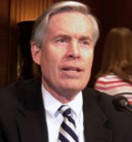Tajh
Jenkins
Science Leadership Academy
Lobbying Assignment 3
Like past years, 2010 has
provided it’s share of child pornography happenings. While there have been
attempts by United States officials to ban all aspects of child pornography,
their efforts in 2010 could have been better.
The U.S.
Attorney General Eric Holder

“Government
cannot solve the child pornography crisis in America unless it takes a broader
approach than currently pursued and looks to the root causes of such deviancy.”
2010 has not been a
productive year in terms of the governments efforts in banning child
pornography. America is currently in a stand still in handling the situation.
According to Patrick A. Trueman, former chief of the U.S. Department of Justice
Child Exploitation and Obscenity Section in the Reagan and Bush I
Administrations, Eric Holder’s indication that the United States is losing in
the war on child pornography is troubling but not surprising.
Patrick A.
Trueman

”Our
efforts today are not partisan because the protection of children, violence
against women, addiction and sexual trafficking are not partisan issues. Nor
are we here today to quarrel with Attorney General Holder … The Attorney
General previously indicated support for the enforcement of obscenity laws. We
are asking that the prosecution of obscenity, which seems to be on hold in the
Obama Administration, be given a high priority because of the widespread harm
we now know that obscene material is causing.
Patrick Trueman heads the
War on Illegal Pornography, a coalition effort of many national, state and
local groups working to encourage enforcement of federal laws against obscene
adult pornography. He is also the founder of the website PornHarms.com, http://pornharms.com. The website categorizes and posts peer-reviewed studies on the
harmful aspects of pornography. Studies and articles on PornHarms.com explain
and discuss the brain science of pornography, which indicates that regular
consumers of porn are at risk of brain manipulation and addiction leading to
increasingly deviant behaviors, including, for some, an interest in child
pornography
Nearly every current
government official elected has indicated their support for banning child
pornography. The problem is that not enough of the officials are stepping up
their efforts to really making a difference on this specific issue. From what I
researched, other than the two government officials that I spoke about in my
second lobbying assignment as well as Eric Holder, there aren’t really any
officials that I researched who has mad significant strides in banning it. This
issues does get great media coverage because of all the court cases and news
that pertain to child pornography. Citizens have expressed support on banning
child pornography as the issue has become bigger throughout the years because
of the media attention. There are multiple facebook groups that illustrate citizens tryings to prevent child porn.
There have been past
policies on this issue:
- Children's Internet Protection Act of 2000 (CIPA)
- Child Online Protection Act of 1998 (COPA)
- Child Protection and Sexual Predator Punishment Act of
1998
- Child Pornography Prevention Act of 1996 (CPPA)
- Communications Decency Act of 1996 (CDA
* In 2002, the
Supreme Court made a decision to reject Congress' attempt to combat child
pornography
in the computer age.
Stakeholders on
this issue include
- Children and young people
- Parents Guardians and Educators
- Industry
- The Research Community and NGO’s
- Law Enforcement
- Social Service Organizations
- Internet Service Providers (ISPs) and other Electronic
Service Providers (ESPs)
- Teacher Organizations, Academic and Research Communities
- Government Agencies
- Owners of
Internet cafés and other public access providers e.g. libraries,
telecentres, PC Bangs6 and online gaming centres etc
There are many people who
are working on this issue:
- Cristina Bueti
and Sandra Pandi (ITU)
- John Carr
(Children’s Charities’ Coalition on Internet Safety)
- Raoul Chiesa and
Francesca Bosco (United Nations Interregional Crime and Justice Research
Institute)
- Catherine
Cummings and Jessica Sarra (International Centre for Missing &
Exploited Children)
- Johan Martens
(Child Helpline International)
- Michael Moran
(Interpol)

I think that if I am really
serious about this issue, I can influence anyone in the public to want to ban
virtual child pornography. With the help of the public, we would be able to
influence the government to take a more serious approach towards banning all
aspects of child pornography. I think that the government does not see much of
the public wanting to ban child pornography. When it comes to this specific issue,
if the public doesn’t show its seriousness about the situation, then the
government won’t act on it as quickly and effectively.
If I could contact the
authors who wrote the “Guidelines for Policy
Makers on Child Online Protection” I think
that we could really make a difference together. The authors who wrote the
guidelines are the the same people who I listed as the people who are working
on this issue. These are people who are really serious interested in making it
aware that child pornography is a relevant issue that should be taken care of.
If I could get some personal insight on this issue from these people, it would
really help me become more prepared to influence people who are not up on the
issue as they should be. I think that I should come in contact with the authors
as soon as possible.
After doing some research I
have not found any recent meetings or any recent news about government
officials attempt to crack down on child pornography in the future. Therefore,
there aren’t any future meetings or committee headlines that I can talk about.
All of the hearings that I have come across have already taken place.













